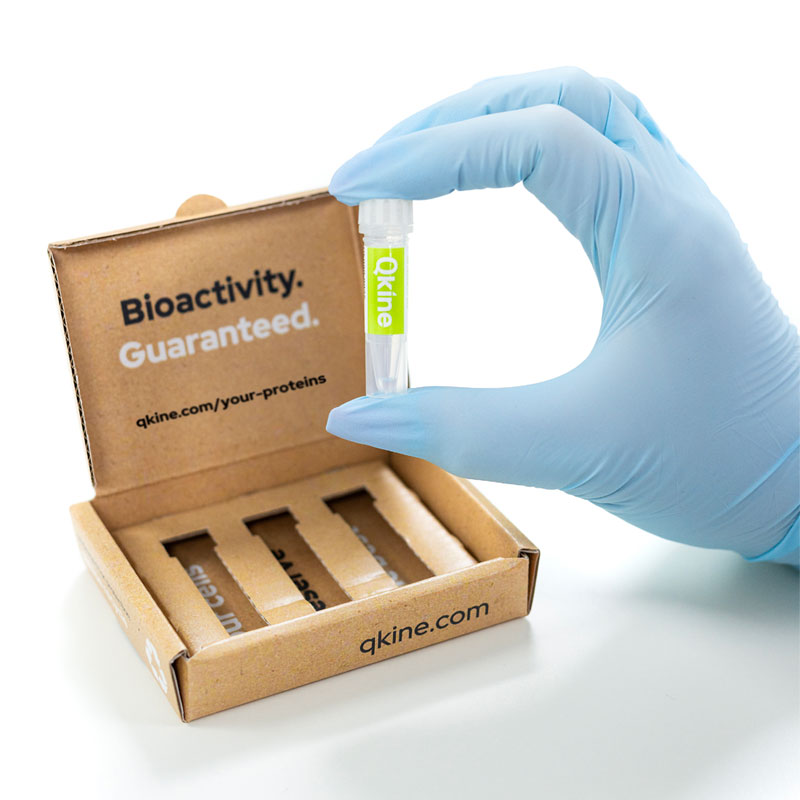Pep talk - October 2024
Qkine freeze prices for 2025 in support of stem cell science
In these economically challenging times, Qkine is committed to supporting our customers, and therefore, we have decided to hold current prices into 2025. This will allow customers to continue to budget effectively and help them maximise the impact of innovations utilising stem cell science.
NEWS
Qkine wins ‘Scale-up of the Year’ at the 2024 Cambridge Independent Business Awards
Qkine were delighted to be named ‘Scale-up of the Year’ at the Cambridge Independent Business Awards 2024. Qkine CEO Catherine Elton and Head of R&D and Collaborations Luana Ferrara accepted our award, sponsored by BDO UK LLP.
All credit goes to our wonderful team at Qkine who have worked so hard, and our thanks go to all who have supported us in our mission to change the future of recombinant proteins!


Qkine are excited to announce our products will now be available on the Product Hub Marketplace of Scientist.com!
Qkine, a leading manufacturer of high purity bioactive proteins, is pleased to announce its sales distribution agreement with Scientist.com Product Hub Marketplace. The AI driven digital research platform Scientist.com will promote and distribute our high purity, guaranteed bioactivity, animal origin-free proteins.
The collaboration between Qkine and Scientist.com will empower stem cell scientists across the continent by providing improved access to innovative growth factors and cytokines from Qkine.
BLOG
The transformative power of hematopoietic stem cells in medicine
Hematopoietic stem cells (HSCs) are at the forefront of a transformative shift in modern medicine, beginning to revolutionize patient care by offering novel therapeutic treatments for a wide range of diseases. This review blog summarizes advances in the clinical use of HSCs in HSC transplantation.
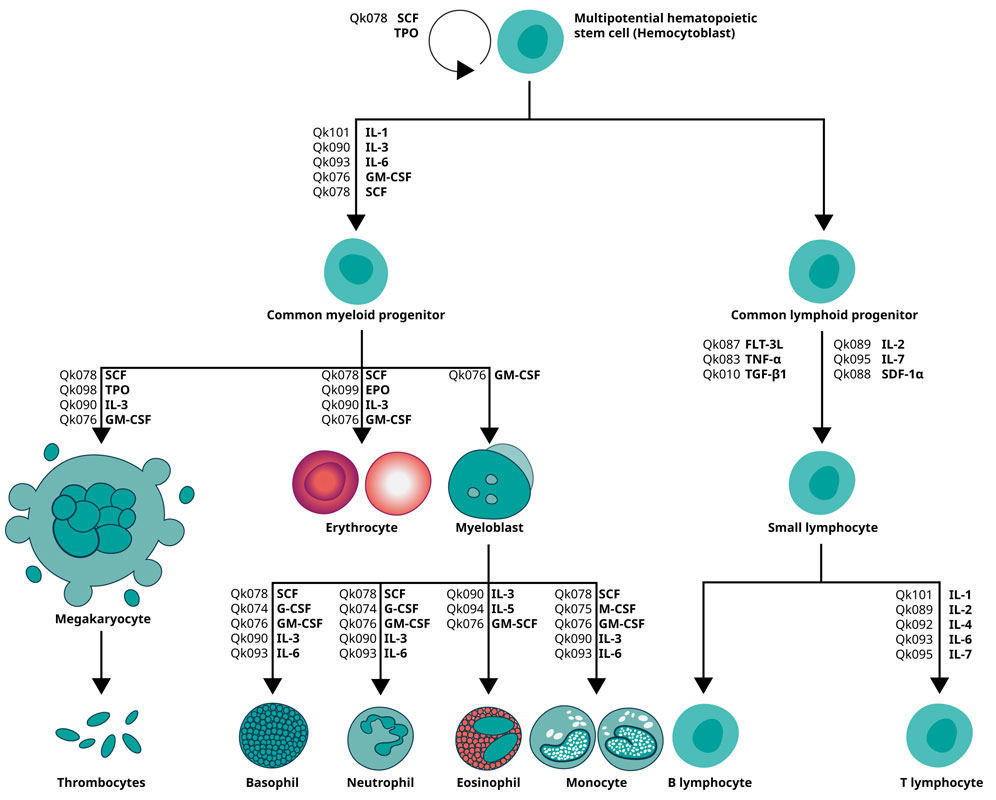
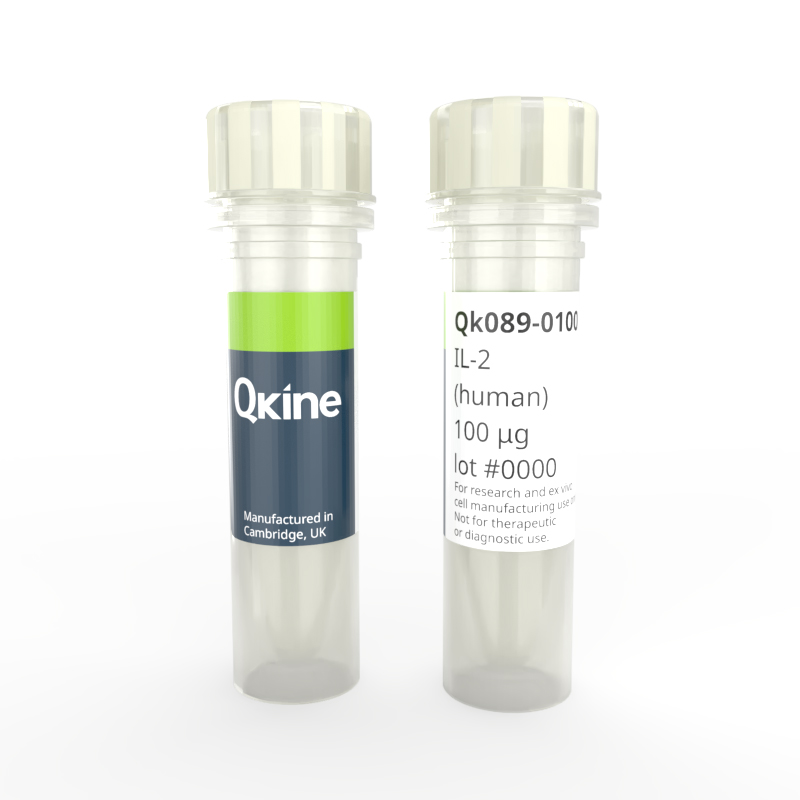
NEW PRODUCT HIGHLIGHT
Recombinant human IL-2 protein (Qk089)
Interleukin-2 (IL-2) is a vital cytokine that regulates immune responses by promoting the growth and activation of T-cells, enhancing immune function, and maintaining immune tolerance for immune activation and suppression.
Qkine has optimised the IL-2 manufacture process to produce a highly bioactive protein with excellent lot-to-lot consistency for enhanced experimental reproducibility.
Recombinant human activin E PLUS protein (Qk067)
Qkine human activin E PLUS protein comprising the mature domain of human activin E protein, is the first exceptionally high purity animal origin-free recombinant human activin E protein for biochemical studies and drug discovery. The generation of this unique Activin E PLUS protein utilised the Qkine TGF beta family protein expression platform and scientific expertise.

All our growth factors are manufactured within a stringent quality framework, ensuring high-quality proteins that maintain robust, reproducible, and physiologically relevant stem cell and organoid cultures that adhere to our Nine-point Quality Commitment.
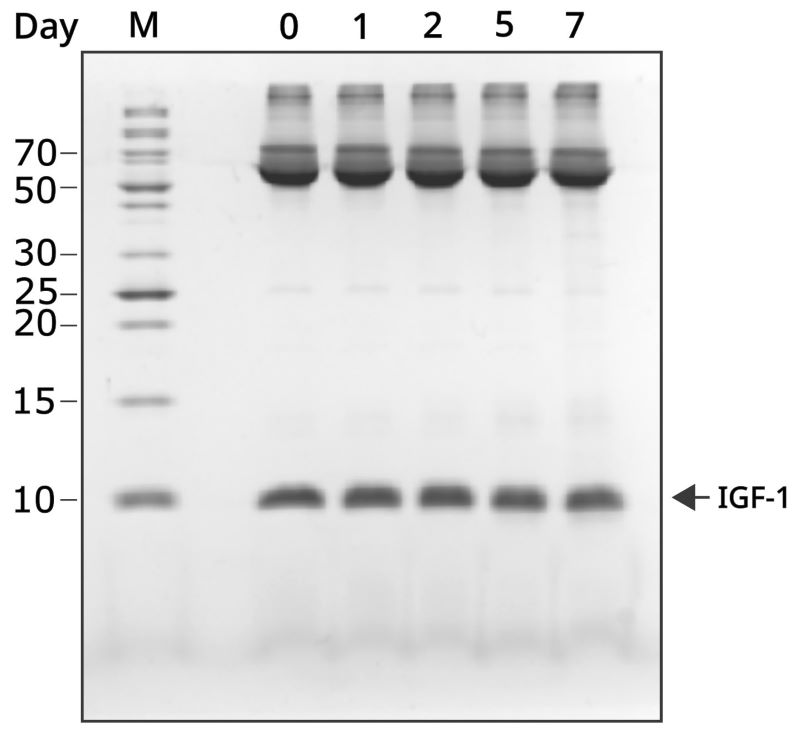
APPLICATION NOTES
Stability of Qkine recombinant growth factors and cytokines in conditioned media
FGF-2 is a key component of stem cell media, it is known to be unstable under cell culture conditions, leading to the necessity for daily media changes to maintain culture conditions for stem cell culture. Although the thermo-instability of FGF-2 is well documented, the thermostability of other essential growth factors has not been investigated. This application note reviews the stability of Qkine growth factors (GM-CSF, IL-6, IGF-1, IGF1 LR3, GDNF, BMP-4, HGF NK1 and TGF-ß1 PLUS) under cell culture-like conditions to ensure maximum cost effectiveness and reproducibility in stem cell cultures.
Differentiation of induced pluripotent stem cells (iPSCs) into ectoderm, mesoderm and endoderm lineages
Human induced pluripotent stem cells (iPSCs) are an in vitro model that represent a pivotal breakthrough in regenerative medicine and cellular biology. Reprogramming iPSCs grants these cells the ability to differentiate into any cell type of the three germ layers: ectoderm, mesoderm, and endoderm. This provides unparalleled potential for disease modeling, drug discovery, and cell-based therapies, all without the ethical concerns associated with using embryonic stem cells.

Ectoderm
Differentiating iPSCs into ectoderm lineage is particularly significant, given the ectoderm’s role in generating the central and peripheral nervous systems, sensory organs, and skin. Differentiating iPSCs into neuroectodermal cells, followed by further differentiating into ectodermal lineages, is critical for studying neurodevelopmental processes, modeling neurological disorders, and developing potential therapies for conditions impacting the nervous system and skin.
In this application note, we outline the method for differentiating iPSCs into neuroectoderm cells using media containing members of our recombinant FGF-2 family, such Qkine FGF2-G3 (Qk053), together with noggin (Qk034).
Mesoderm
Differentiating iPSCs into mesoderm linage of cells is particularly significant, given the mesoderm’s role in generating a wide range of vital tissues and organs, including the heart, blood, muscles, and bones. This provides unparalleled potential for disease modeling, drug discovery, and cell-based therapies.
In this application note, we outline the method for differentiating iPSCs into mesoderm cells using media containing members of our recombinant FGF-2 family, such as Qkine FGF2-G3 (Qk053), along with both activin A (Qk001), and BMP-4 (Qk038) growth factors.
Endoderm
Differentiating iPSCs into endodermal linage cells is particularly important due to the critical roles endodermal derivatives play in human physiology. Understanding the differentiation process of iPSCs into endodermal cells offers promise for developing treatments for a variety of conditions, including liver diseases, diabetes, and cystic fibrosis, as well as for generating organoids for research and transplantation purposes.
In this application note, we outline the method for differentiating iPSCs into definitive endoderm cells using media containing members of our recombinant FGF-2 family, such Qkine FGF2-G3 (Qk053), along with both activin A (Qk001), and BMP-4 (Qk038) growth factors.
Human GM-CSF protein
Granulocyte-macrophage colony-stimulating factor (GM-CSF) is a hematopoietic growth factor involved in the differentiation and activation of monocytes such as macrophages and dendritic cells, and granulocytes such as neutrophils, eosinophils, and basophils.
Qkine human GM-CSF is composed of 144 amino acids with a molecular weight of 14.6 kDa. This protein is animal origin-free, carrier protein-free, tag-free, and non-glycosylated to ensure a homogenous population with exceptional lot-to-lot consistency.
Human IL-3 protein
Recombinant Human Interleukin 3 (IL-3) is a pleiotropic cytokine which plays a crucial role in hematopoiesis and acts as a multi-lineage growth factor. IL-3 is commonly used in cell culture to stimulate the differentiation and maturation of human induced pluripotent stem cells towards mast cells, basophils, neutrophils, eosinophils, monocytes, and megakaryocytes.
Qkine IL-3 comprises 140 amino acids with a molecular weight of 15.2 kDa. This protein is animal origin-free, carrier protein-free, and tag-free to ensure a homogenous population with exceptional lot-to-lot consistency.
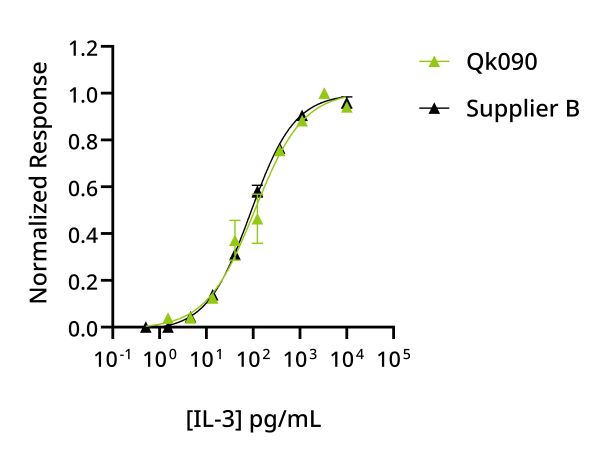
Qkine IL-3 (Qk090) has equivalent bioactivity to IL-3 from an alternative major supplier.
Upcoming Events
- Regulating the Future of Food | October 23-24, 2024 | Amsterdam, The Netherlands
- Oxford Stem Cell Institute Symposium | October 24-25, 2024 | Oxford, UK
- Advanced Therapies 2024 | November 12-13, 2024 | Pennsylvania Convention Center, Philadelphia, USA
- GSK Supplier Diversity Showcase | November 13, 2024 | Stevenage, UK
- International Conference on Cultured Meat, ISCCM10 | November 17-20, 2024 | Maastricht, The Netherlands
What’s next?
Qkine are committed to producing the most high quality and bioactive growth factors and cytokines, coming soon to our range are the potent cytokines IGF-2, INF-gamma, IL-18, IL-15 and mouse SCF. To add to our wide range of growth factors, FGF-19.
